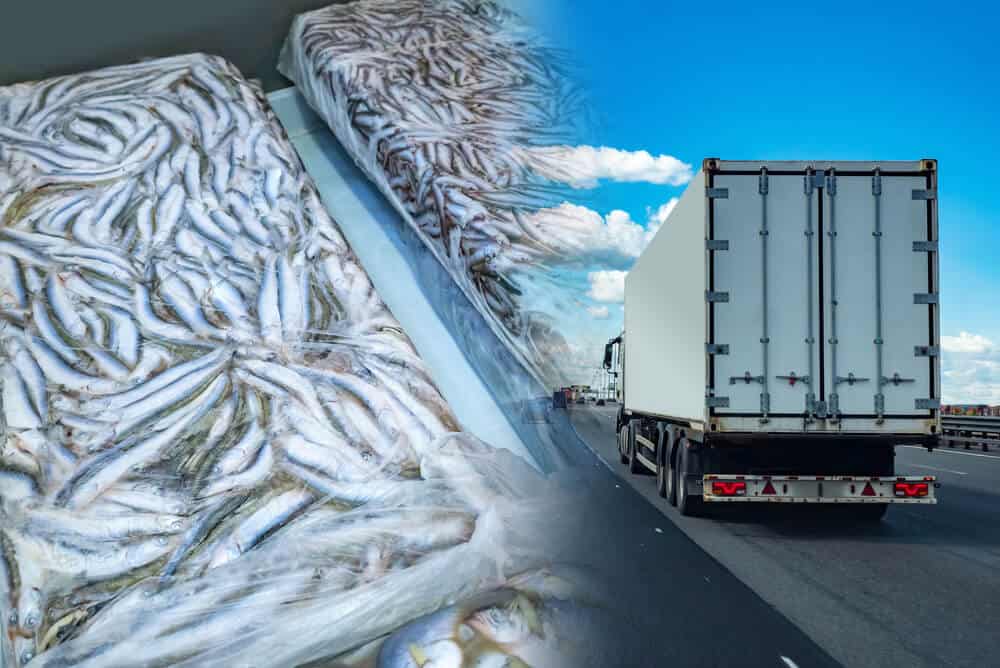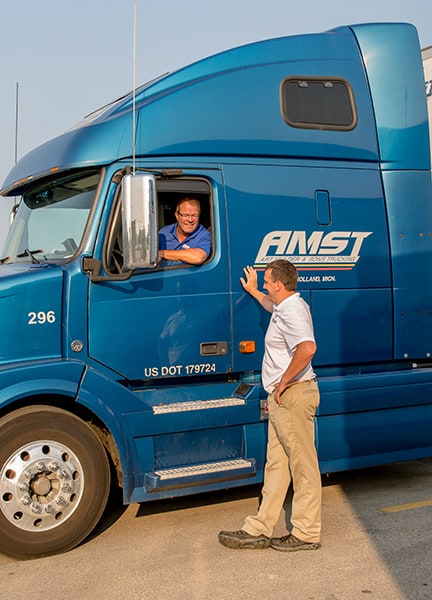Guide to Refrigerated Transportation Services
Leave a CommentEvery day, supermarket shoppers around the world ask themselves how it is possible for food that was grown hundreds or even thousands of miles away to still be fresh. This question can be answered with just two words: speed and refrigeration. This article will expand on these two words and explain how refrigerated transportation has revolutionized logistics.
What is Refrigerated Transport?
Refrigerated transport is a method of moving perishable goods from one place to another in a temperature-controlled environment. This is sometimes done using refrigerated shipping containers and railcars, but most of the products that must be moved in this way in the United States are transported on large trucks pulling specially designed trailers.
The first refrigerated trucks were used by ice cream companies in the 1920s, but they relied on ice to prevent melting and keep things cool. Refrigerated transportation as we know it today can trace its roots back to 1940 when a self-taught mechanic and engineer named Frederick McKinley Jones invented the first portable air-conditioning unit. During World War II, this innovation was used to get fresh food to combat troops and crucial medical supplies to field hospitals. The refrigerated transportation sector blossomed after the war and has grown significantly in recent years. Today the industry serves over 56,000 businesses in the U.S., and it is expected to be worth more than $21 billion by 2025.
Refrigerated Shipping and Cold Storage Services

The experts at Mulder Brothers accomplish this with a network of carrier partners that use trailers that have advanced refrigeration systems and insulated superstructures. These trucks can transport goods at temperatures as low as -20 degrees Fahrenheit, and they can move products ranging from food to exotic animals. The services offered include:
- Temperature-controlled FTL and LTL services
- Refrigerated warehousing and short-term storage
- Food warehousing services that meet FDA requirements
- Cross-docking and redelivery services
Supply Cold Chain Logistics
Getting perishable goods to their destinations in a timely manner and in an appropriate condition requires an entire temperature-controlled supply chain consisting of refrigerated trucks and temperature-controlled warehouses and dispatch facilities. If any link in this delicate chain is broken and temperatures are allowed to rise, the goods being moved can become unstable and possibly hazardous. When such a system is in place and managed effectively, it can extend the shelf life of products by days or even weeks.
Refrigerated Freight Shipping vs. Refrigerated LTL
Moving less-than-truckload, or LTL, shipments adds yet another layer of complexity to the refrigerated transportation process. Smaller vehicles like refrigerated panel vans or box trucks can be used to transport smaller loads, but combining shipments on tractor-trailers is the most commonly used and cost-effective method. This must be done very carefully to ensure that each shipment remains at an appropriate temperature, which is why many shipping providers are unable to offer this service.
Benefits of Refrigerated Transport
Refrigerated transport allows consumers around the country to enjoy foods all year round that were once considered seasonal treats. It also ensures that hospitals and clinics have adequate supplies of effective medicine on hand to treat patients. In addition to food and medical supplies, refrigerated trucks can be used to transport cargoes as diverse as fresh flowers, animals that are sensitive to heat, and works of art that could be damaged by fluctuations in temperature or humidity.
Safety for Refrigerated Products
Safety is a primary concern when moving perishable goods. Frozen food that thaws and then refreezes during transportation poses a serious health risk to those who consume it, and fresh produce must be kept cool to prevent bacteria from growing. Almost 50 million Americans get sick each year after eating spoiled food, which is why Congress passed the Food Safety Modernization Act in 2011. This law introduced seven strict rules governing the way food in the United States is grown, harvested and transported, and every company that offers refrigerated transportation services must comply with it.
Refrigerated Transportation Logistics for A Wide Variety of Industries
Food producers and pharmaceutical companies are usually the biggest clients of refrigerated transportation providers, but they are not their only customers. Other industries that require products to be shipped in a climate-controlled environment include:
- Beekeepers: Honey bees produce an enormous amount of heat, which cannot escape when they are transported in a standard truck.
- Art dealers: Oil paintings can be damaged when temperatures or humidity levels are not carefully controlled.
- Christmas tree suppliers: Most of the Christmas trees sold in the United States each holiday season reached their destinations on refrigerated trucks.
- Cosmetics companies: Perfumes and cosmetics like lipsticks can lose their distinctive scents or melt when exposed to heat.
Rising Demand for Fresh Perishable Goods
Sales of fresh food increased by more than 10 percent in 2020 despite a global pandemic. Consumers are also becoming far more savvy about expiration dates and diseases like E. coli and salmonella, which makes quality just as important as quantity for food producers. A recent study revealed that consumers are even more concerned about perishability now than they were before the COVID-19 outbreak.
Compliance and Regulation for Refrigerated Transport
Food freshness and medicine efficacy are ensured by laws, regulations, and industry standards. Refrigerated transport suppliers must be aware of and comply with all of these rules, and they should also stay abreast of changes made to the best practices guidelines of organizations like the Global Cold Chain Alliance and International Road Transport Union. These guidelines cover issues ranging from maintaining sanitary conditions to ensuring drivers are properly trained.
Challenges of Refrigerated Transportation Services
Delivering perishable goods on time and in a usable state is not without its challenges. Drivers who operate refrigerated trucks must understand how they work and what signs of trouble to look out for. There are also myriad rules and regulations to follow, and companies that ship their products in climate-controlled environments usually have very specific needs and requirements. Refrigerated trucks cost more to purchase and maintain, and a nationwide shortage of truck drivers is heaping even more pressure on an already strained supply chain.
Logistics and Timing of Cold Chain Shipping
The old adage “timing is everything” is particularly appropriate when describing refrigerated transport. Food must reach supermarkets and convenience stores before expiration dates, and medicines and vaccines have to be delivered quickly and efficiently during health scares like pandemics. All of this has to be accomplished while maintaining specific temperatures during storage and transportation, which requires a great deal of skill and expertise.
Costs of Refrigerated Transport and Storage
Transporting goods in refrigerated trucks is more expensive than moving them in standard tractor-trailers, and this is especially true when LTL loads are being shipped. The equipment used is complex and expensive, and the utility bills for climate-controlled warehouses can be eye watering. However, companies like Mulder Brothers that have extensive experience in this area are aware of the challenges, and they have policies and procedures in place that are designed to minimize expenses and provide their customers with a more affordable service.
Product Safety
Safety first is another phrase commonly used in the refrigerated transport industry. Consistent temperatures must be maintained during the entire transportation process to prevent food from spoiling and medicines from losing their efficacy, and that requires expertise. Manufacturers and producers that use refrigerated trucks rely on transportation companies to protect their reputations by making sure their products are safe when they reach their destinations, and this is a responsibility that Mulder Brothers take very seriously.
Maintaining Refrigerated Cargo Integrity in Transportation and Storage
Climate-controlled warehouses and cold storage facilities are just as important as refrigerated trucks when perishable goods are shipped, and they are used to prevent spoiling, rotting, and insect damage at transit hubs. Temperatures are maintained in storage facilities with either vapor absorption or vapor compression systems. Vapor absorption systems are more expensive to install, but they cost less to run.
Industries that Use Refrigerated Transportation Services

Perishable Food and Beverage Products
Perishable food and beverage products shipped in refrigerated trucks fall into three categories. There are foods that are still alive like fruits and vegetables, and there are foods like meat that are no longer alive but must be kept fresh. There are also commodities like tobacco and beer that should be kept at a certain temperature.
Pharmaceuticals
Many of the most common pharmaceutical products used by Americans must be shipped in climate-controlled environments. Insulin loses its efficacy if it is stored or shipped at temperatures exceeding 86 degrees Fahrenheit, and eye drops used to treat glaucoma should not be exposed to temperatures higher than 45 degrees Fahrenheit. This is also the temperature that life-saving rescue inhalers must be kept at.
Vaccines
The vast majority of vaccines need to be kept cool to prevent them from losing their effectiveness. If an unbroken cold chain is not maintained during their storage and shipment, people may be given useless vaccines and spread dangerous diseases. Maintaining consistent temperatures is particularly important when transporting the vaccines for mumps, rubella, measles and hepatitis.
Chemicals
Not storing chemicals at the right temperature can lead to disaster, so refrigerated transport companies take special care when they ship flammable gases and combustible substances. They check material safety data sheets to find safe storage and transport temperatures, and they pay close attention to a chemical’s flash point.
Choosing the Best Refrigerated Transport Partner

Consider Your Cold-Transport and Refrigerated Shipping Needs
News travels quickly in the information age, and stories about spoiled food or ineffective medicines often go viral. This is why it is a good idea to do plenty of research before choosing a refrigerated transport company and limit the choices to providers that offer competitive rates, excellent support and convenient services.
Experience is Key with Supply Chain Logistics for Refrigerated Goods
Some transportation brokerage firms have little or no trucking experience, but the experts at Mulder Brothers have been shipping products for over five decades and know trucking well. They can also provide an unbroken cold chain with temperature-controlled warehouses and distribution centers.
Contact Mulder Brothers
If you would like to learn more about the refrigerated and frozen transportation services available from Mulder Brothers, you can call us at (616) 392-5907, or drop us a line on our website.